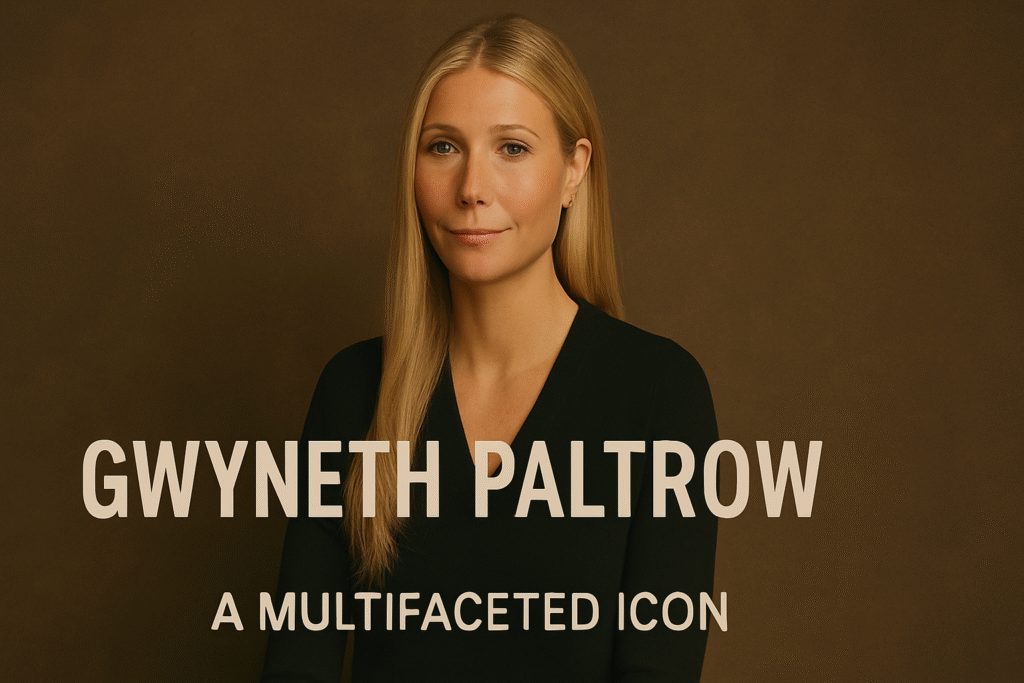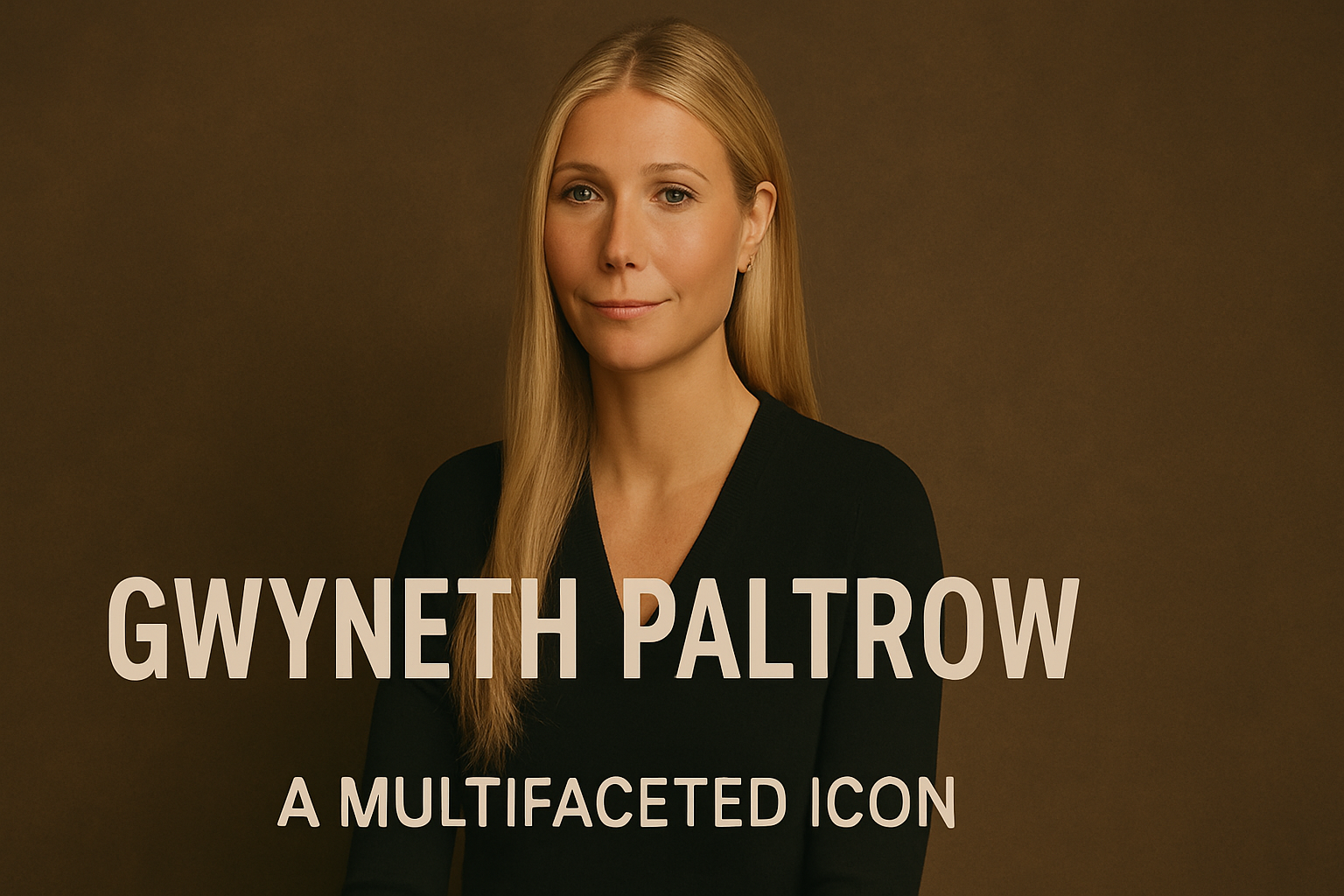Gwyneth Paltrow, born September 27, 1972, in Los Angeles, California, is a name synonymous with versatility, evolving from an Academy Award-winning actress to a polarizing lifestyle guru.
Her journey from Hollywood starlet to the founder of Goop, a wellness empire valued at $250 million, reflects a unique blend of talent, ambition, and controversy.
This article delves into Paltrow’s life, career, and the cultural impact of her brand, exploring the duality of her public persona as both a celebrated figure and a lightning rod for criticism.
Early Life and Acting Career
Paltrow was born into a family steeped in entertainment. Her father, Bruce Paltrow, was a television producer, and her mother, Blythe Danner, a Tony Award-winning actress.
From a young age, Paltrow was drawn to acting, making her stage debut at five in a walk-on role. Her family’s move to New York City at age 11 exposed her to a vibrant cultural scene, and she honed her craft at a prestigious girls’ school and a Vermont acting camp.
Choosing to forgo college, Paltrow pursued acting full-time, a decision supported by her parents after she performed alongside her mother in William Inge’s Picnic at the Williamstown Theatre Festival.
Her early film roles showcased her range. She played a young Wendy in Steven Spielberg’s Hook (1991) and a drifter in Flesh and Bone (1993), earning critical praise.
Her breakout came with the 1995 thriller Se7en, where she starred alongside Brad Pitt, her then-boyfriend. The role that cemented her as a star was Viola in Shakespeare in Love (1998), earning her an Oscar for Best Actress at age 26.
The film itself won Best Picture, solidifying her status as a leading lady. Paltrow’s career flourished with diverse roles, from the bohemian artist in Mrs.
Parker and the Vicious Circle (1994) to the troubled mathematician in Proof (2005), a role she had originated on stage in London. She also gained mainstream fame as Pepper Potts in the Iron Man series (2008–2019), showcasing her ability to balance indie and blockbuster projects.
The Rise of Goop
In 2008, Paltrow launched Goop, initially a newsletter sharing lifestyle tips from her kitchen. The name, derived from her initials and the playful notion of “goop,” evolved into a wellness empire.
What began with recipes for turkey ragù and travel recommendations grew into a brand offering skincare, supplements, and controversial products like jade eggs and vagina-scented candles.
Goop’s success, with a valuation of $250 million by 2018, stems from Paltrow’s ability to market her aspirational lifestyle to an audience enamored with her rarefied world.
However, Goop has faced significant criticism. Its high-end products, like $75 vitamins and infrared sauna blankets, are often seen as elitist, catering to wealthy consumers.
Paltrow’s wellness claims, such as her endorsement of restrictive diets or unconventional therapies like rectal ozone therapy, have drawn scrutiny for lacking scientific backing.
Critics argue that Goop promotes a potentially harmful obsession with “perfect” health, bordering on orthorexia.
In 2025, Paltrow announced a shift away from her strict paleo diet, admitting on her podcast that she now enjoys bread, pasta, and cheese, signaling a more balanced approach to wellness. This pivot reflects her acknowledgment of the unsustainable pressure her brand may have perpetuated.

Personal Life and Public Perception
Paltrow’s personal life has often been as headline-grabbing as her career. Her relationships with Brad Pitt, Ben Affleck, and Chris Martin have fueled tabloid fascination.
Her romance with Pitt, sparked on the set of Se7en, was a high-profile engagement that ended due to her self-admitted unreadiness for marriage.
Her relationship with Affleck, from 1997 to 2000, was marked by his struggles with alcoholism and emotional distance, though she praised his “technical excellence” in intimate moments.
Her marriage to Coldplay’s Chris Martin, with whom she has two children, Apple and Moses, ended in 2014 with the now-famous term “conscious uncoupling,” a phrase that both intrigued and baffled the public.
Paltrow’s current marriage to producer Brad Falchuk, whom she wed in 2018, has been less tumultuous, with a heartfelt text from Falchuk read on her podcast in 2025, highlighting her multifaceted appeal.
Paltrow’s public image is a study in contrasts. She is both admired for her poise and criticized for her perceived privilege.
A 2014 Vanity Fair controversy, where she attempted to block an article about her, fueled speculation of hidden scandals, though nothing concrete emerged.
Her 2023 ski collision trial in Utah, where she was sued by retired optometrist Terry Sanderson for $300,000, became a cultural spectacle.
Paltrow’s countersuit for $1, her composed courtroom demeanor, and her whispered “I wish you well” to Sanderson after her victory amplified her enigmatic persona. The trial, livestreamed and rife with viral moments, underscored her ability to captivate, even in controversy.
Cultural Impact and Legacy
Paltrow’s influence extends beyond acting and wellness. She has redefined celebrity entrepreneurship, turning Goop into a cultural phenomenon despite its controversies.
Her lifestyle brand has inspired both devotion and derision, with products like the vagina candle sparking debates about feminism, consumerism, and authenticity.
Her willingness to embrace polarizing wellness trends has made her a lightning rod for criticism, yet her business acumen is undeniable.
At 52, Paltrow remains a figure of fascination. Her recent biography, Gwyneth by Amy Odell, released in July 2025, offers new insights into her life, from her fallout with Madonna to her past romances.
Paltrow’s response—calm and unbothered—reflects her curated approach to public scrutiny. She continues to evolve, balancing her acting legacy with her entrepreneurial ventures, all while navigating the complexities of fame.
Whether admired or mocked, Paltrow’s ability to remain relevant, from her Oscar win to her wellness empire, cements her as a multifaceted icon whose influence is unlikely to fade.
